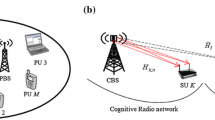Abstract
The optimal resource allocation in MIMO cognitive radio networks with heterogeneous secondary users, centralized and distributed users, is investigated in this work. The core aim of this work is to study the joint problems of transmission time and power allocation in a MIMO cognitive radio scenario. The optimization objective is to maximize the total capacity of the secondary users (SUs) with the constraint of fairness. At first, the joint problems of transmission time and power allocation for centralized SUs in uplink is optimized. Afterwards, for the heterogeneous case with both the centralized and distributed secondary users, the resource allocation problem is formulated and an iterative power water-filling scheme is proposed to achieve the optimal resource allocation for both kinds of SUs. A dynamic optimal joint transmission time and power allocation scheme for heterogeneous cognitive radio networks is proposed. The simulation results illustrate the performance of the proposed scheme and its superiority over other power control schemes.






Similar content being viewed by others
References
FCC. (2010). Spectrum policy task force report. ET Docket No. 02–380 and No. 04–186, Sep. 2010.
Adian, M. G., & Aghaeinia, H. (2012). Spectrum sharing and power allocation in multiple-in multiple-out cognitive radio networks via pricing. IET Communications, 6(16), 2621–2629.
Seung-Jun, Kim., & Giannakis, G. B. (2011). Optimal resource allocation for MIMO ad hoc cognitive radio networks. IEEE Transactions on Information Theory, 57(5), 3117–3131.
Zhang, R., & Liang, Y. C. (2008). Exploiting multi-antennas for opportunistic spectrum sharing in cognitive radio networks. IEEE Journal of Selected Topics in Signal Processing, 2(1), 88–102.
Zhang, L., Liang, Y. C., & Xin, Y. (2008). Joint beamforming and power allocation for multiple access channels in cognitive radio networks. IEEE Journal on Selected Areas in Communications, 26(1), 38–51.
Scutari, G., & Palomar, D. P. (2010). MIMO cognitive radio: A game theoretical approach. IEEE Transactions on Signal Processing, 58(2), 761–779.
Xie, R., Yu, F., Ji, H., & Li, Y. (2012). Energy-efficient resource allocation for heterogeneous cognitive radio networks with femtocells. IEEE Transactions on Wireless Communications, 11(11), 3910–3920.
Su, W., Matyjas, J. D., & Batalama, S. N. (2012). Active cooperation between primary users and cognitive radio users in heterogeneous Ad Hoc networks. IEEE Transactions on Signal Processing, 60(4), 1796–1805.
Ge, M., & Wang, S. (2012). Fast optimal resource allocation is possible for multiuser OFDM-based cognitive radio networks with heterogeneous services. IEEE Transactions on Wireless Communications, 11(4), 1500–1509.
Wang, S., Zhou, Z., Ge, M., & Wang, C. (2013). Resource allocation for heterogeneous cognitive radio networks with imperfect spectrum sensing. IEEE Journal on Selected Areas in Communications, 31(3), 464–475.
Ni, Q., & Zarakovitis, C. (2012). Nash bargaining game theoretic scheduling for joint channel and power allocation in cognitive radio systems. IEEE Journal on Selected Areas in Communications, 30(1), 70–81.
Chen, J., & Swindlehurst, A. (2012). Applying bargaining solutions to resource allocation in multiuser MIMO-OFDMA broadcast systems. IEEE Journal of Selected Topics in Signal Processing, 6(2), 127–139.
Xu, H., & Li, B. (2010). Efficient resource allocation with flexible channel cooperation in OFDMA cognitive radio networks In Proceedings of IEEE INFOCOM conference, pp. 561–569.
Boyd, S., & Vandenberghe, L. (2004). Convex optimization. Cambridge: Cambridge University Press.
Magnus, J. R., & Neudecker, H. (1999). Matrix differential calculus with applications in statistics and economics (2nd ed.). Wiley: New York.
Osborne, M. J., & Rubenstein, A. (1994). A course in game theory. Cambridge: MIT Press.
Yu, W., Ginis, G., & Cioffi, J. M. (2002). Distributed multiuser power control for digital subscriber lines. IEEE Journal on Selected Areas in Communications, 20(5), 1105–1115.
Boyd, S., & Mutapcic, A. (2007). Subgradient methods, notes for EE364. Standford: Standford University.
Shum, K. W., Leung, K., & Sung, C. (2007). Convergence of iterative waterfilling algorithm for gaussian interference channels. IEEE Journal on Selected Areas in Communications, 25(2), 1091–1100.
Author information
Authors and Affiliations
Corresponding author
Rights and permissions
About this article
Cite this article
Adian, M.G., Aghaeinia, H. Optimal Resource Allocation in Heterogeneous MIMO Cognitive Radio Networks. Wireless Pers Commun 76, 23–39 (2014). https://doi.org/10.1007/s11277-013-1486-0
Published:
Issue Date:
DOI: https://doi.org/10.1007/s11277-013-1486-0




